-
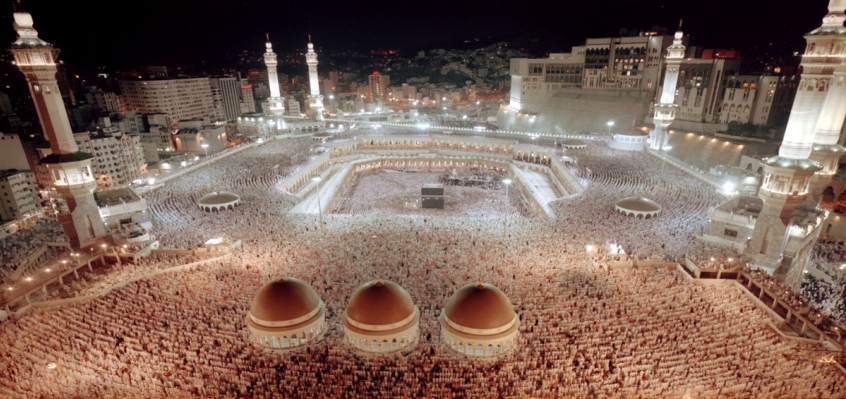
Every year millions of Muslims travel to Mecca for the Hajj G.M Farooq Every year about 2 million Muslims travel to Al-Masjid Al-Haram, Islam's most sacred mosque, in Mecca, Saudi Arabia, where they perform a number of spiritual rites, in a process known as the Hajj.
- Performing the Hajj, is one of the five pillars of Islam, and all able-bodied Muslims should go at least once in their lives if they can afford it. Umrah, which is known as the 'lesser pilgrimage', is a journey to Mecca (Makkah) at any time in the year.
- The pilgrimage lasts for six days. It occurs during Dhu Al-Hijjah, the 12th month in the Muslim calendar. This year, the Hajj is expected to fall on October 1-6, but it is difficult to know in advance as it is based on lunar cycles.
- Mecca is thought to be the place where Ishmael and his mother Hagar were provided with a spring of water in the desert. As it is the most sacred place in Islam, non-Muslims are forbidden from entering.
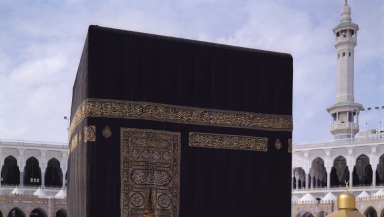
The Kaaba is Islam's most sacred site G.M Farooq - The Kaaba, or 'the cube', is a black, box-shaped building at the centre of the mosque. It is built around a black stone, which many pilgrims try to kiss. Muslims believe the Kaaba was originally built by Abraham and Ishmael, but the site was re-dedicated by Muhammad and has been reconstructed since. When Muslims pray, wherever they are, they turn towards the Kaaba, and during the Hajj pilgrims walk anti-clockwise round it seven times.
- There are a number of other ritual acts during the Hajj, including 'the stoning of the devil'. Pilgrims travel to Mina, a small village about 5km from Mecca where throw pebbles at stone pillars which represent the devil.
- Both men and women dress in white during Hajj – a symbol of the state of purity they are entering. Changing their clothes is part of the process known as 'assuming Ihram', a sacred state that pilgrims adopt at the beginning of the Hajj. Pilgrims also refrain from wearing perfumes, men must not wear any sewn garments and women do not cover their faces.
- Pilgrims drink the water of the Zamzam well, located 20m east of the Kaaba, as it is thought to have special properties. The water is believed to come from the same source as the spring which provided water for Ishmael.
- The Eid Al-Adha is a feast marking the end of the pilgrimage. It is known as the feast of sacrifice, in remembrance of Abraham's willingness to sacrifice Ishmael, as the story is recorded in Islamic tradition.
- Many pilgrims stay in the thousands of white tents set up in the valley of Mina. Many suffer heat exhaustion in the 30-40˚C heat.
-

Shawn Bolz scandal: An overdue reckoning of the Charismatic Church
-

Pew Research challenges claims of revival in the UK
-

Bethel Church admits failures after exposé alleges prophetic deception, sexual abuse
-

Iran’s unyielding cry: from economic collapse to the fall of the theocracy
-

Study finds ‘Quiet Revival’ report has boosted evangelicals’ confidence in sharing faith
-

Sarah Mullally officially confirmed as Archbishop of Canterbury
Most Popular
related articles
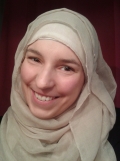
'I used to be a Christian... but converted to Islam'
'I used to be a Christian... but converted to Islam'
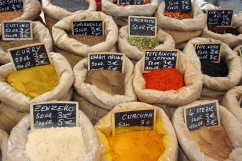
Hummus, world peace and the kingdom of God
Hummus, world peace and the kingdom of God
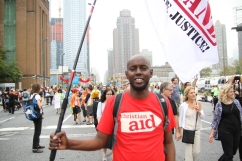
Atheists, Baptists and Baha'i come together to tackle climate change
Atheists, Baptists and Baha'i come together to tackle climate change
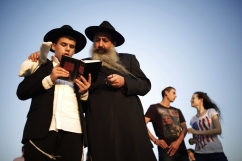
8 things every Christian should know about Rosh Hashanah
8 things every Christian should know about Rosh Hashanah
Not in my name: How Muslims are responding to ISIS
Not in my name: How Muslims are responding to ISIS
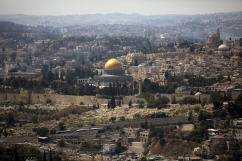
Jerusalem: Chief Rabbis urge boycott of prayer vigil organised by US evangelicals
Jerusalem: Chief Rabbis urge boycott of prayer vigil organised by US evangelicals
News

The problem with Labour’s Islamophobia definition
Whether it's called Islamophobia or "anti-Muslim hostility", the threat is the same.

Long-term emotional distress persists for women decades after abortion, studies suggest
Some women continue to experience emotional distress decades after having an abortion, according to recent research that challenges the assumption that such effects are always short-lived.

Without fuss or fanfare, the local church is stepping in to support the vulnerable
The role of the Government, and public services, are vital. But we, as the Church, have a key role to play in providing essential, everyday support.

CARE urges pro-lifers to write to Lords, and pray to God to stop unrestricted abortion
No impact assessment on the change has taken place.



